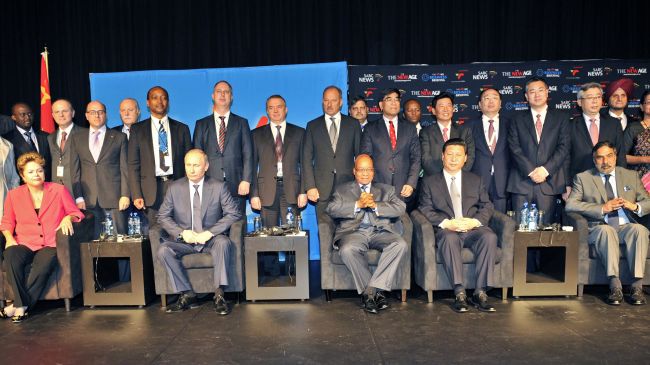BRICS calls for “political and diplomatic means” over Iran issue

By Sara Rajabova
Leaders from emerging powers have voiced concern over unilateral sanctions and the threat of military action against Iran.
The BRICS member states called for "political and diplomatic means" to deal with the issue of Iran's nuclear energy program on the second day of the group's fifth annual summit held in the South African city of Durban on Wednesday, Press TV reported.
"We are concerned about threats of military action as well as unilateral sanctions against Iran," leaders from Brazil, Russia, India, China and South Africa said following the two-day summit.
"We recognize Iran's right to peaceful use of nuclear energy in accordance with the Committee's international obligations and stand for resolving the issues through political and diplomatic means and a dialogue, as well as between the International Atomic Energy Agency (IAEA) and Iran, and in accordance with the UN Security Council's relevant resolutions and Iran's obligations under the Treaty on the Non-Proliferation of Nuclear Weapons (NPT)," the document says.
The statement followed speculative remarks about Iran's nuclear energy program by US President Barack Obama, who said that "all options are on the table" and Washington "will do what is necessary to prevent Iran from obtaining the world's worst weapons."
BRICS, originally "BRIC" before the inclusion of South Africa in 2010, is the association of emerging national economies -- Brazil, Russia, India, China and South Africa.
All member countries of the organization have good relation with Iran in economical and the other spheres.
However, because the several rounds of sanctions imposed on Iran by US and EU, the trade between these countries and Iran has become increasingly strained. The biggest importers of the Iranian oil -- India and China -- have cut the oil imports from this country because of sanction.
India, the world's fourth biggest oil importer and the second largest buyer of Iranian crude after China, shipped in about 271,200 bpd oil from Iran in the period from April to February, trade data showed, below the government's target of 310,000 bpd for this fiscal year, Reuters reported.
Also, China's investment and bilateral trade with Iran declined sharply in 2012, mostly as a result of Western sanctions going into effect.
In January, Iran's oil minister reported that oil sales had declined by 40 percent in 2012. The FY 2013 Iranian budget (yet to be passed), for the year that began March 21, forecasts a 40 percent decline in oil revenue year-on-year. This figure was based on Iran selling between 0.9 million b/d and 1.3 million b/d in 2013, a quarter of the approximately 4 million b/d Iran sold in 2010 and roughly half the 2.2 million b/d it sold in 2011.
Europe and the United States introduced tough sanctions targeting Iran's oil exports to force Iran to the negotiating table over its nuclear program.
Iran has categorically rejected the allegation, maintaining that as a committed signatory to the Non-Proliferation Treaty and an International Atomic Energy Agency member, it is entitled to develop nuclear technology for peaceful purposes.
Here we are to serve you with news right now. It does not cost much, but worth your attention.
Choose to support open, independent, quality journalism and subscribe on a monthly basis.
By subscribing to our online newspaper, you can have full digital access to all news, analysis, and much more.
You can also follow AzerNEWS on Twitter @AzerNewsAz or Facebook @AzerNewsNewspaper
Thank you!
